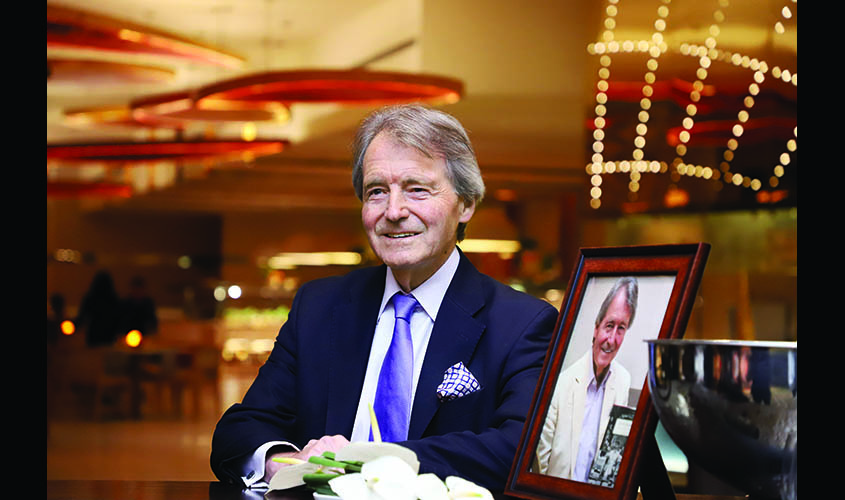Steven Spurrier is an acclaimed wine expert from Britain and a wine merchant who is often referred to as “the champion of French wine”. Spurrier has also developed his own English sparkling wine, Bride Valley. In conversation with Guardian 20, Spurrier speaks about his 50-year-old journey in the wine space and about his autobiography, Wine: A Way of life.
Q. What encouraged you to move to this particular segment? And how were you introduced to it?
A. I was introduced to wine by my grandfather who, on Christmas Eve 1954, when I was 13 years old, and had just completed my first term at Rugby School, decided I was old enough to have a glass of port. The butler brought me a glass and the decanter was pushed towards me. I took a sip and it knocked me sideways. “What’s this, Grandpa?” I asked, “Cockburns 1908, my boy” he replied. From that moment, I decided to go into the wine trade when I grew up.
Q. What’s the best wine you have ever tasted?
A. That is an impossible question to answer, for “best” as it is subjective. So, I will go for the most memorable and this was a bottle of Chateau Lafite-Rothschild 1806 at the Darroze Restaurant in Villeneuve de Marsan, south-west France. The wine was from a batch of 24 bottles that had been re-corked for the final time at the chateau in 1953, six of each going to the restaurants with the best wine lists in France, of which Darroze was one.
Q. You have produced your own English sparkling wine, Bride Valley in Dorset. Tell us about it.
A. When my wife bought a 200-acre farm on the outskirts of the village, I noticed that there was a lot of chalk in the soil and after some research found out that we were in the same region as Kimmeridge, the village after which the chalk soil in Champagne is known. The farm is in a bowl, facing south-east, south and south-west and the lower slopes are sheltered from the wind. It occurred to me that one day, I might plant some vines, but it was Nyetimber [English sparkling wine] beating all the competition from Champagne at the International Wine and Spirit Competition in the mid-1990s and then Ridgeview [English sparkling wine] doing the same at the Decanter World Wine Awards in 2010. All this made me decide that it was time to plant a vineyard to produce English Sparkling Wine. I presented a dossier to the Boisset family at Vinexpo in June 2017 and they gave me lots of advice and the first two hectares went in 2009, our very first vintage being a few hundred bottles in 2011 from three-year-old vines. We are now up to 42,000 vines on
10 hectares.
Q. How would you describe the demand for wine in India?
A. The demand for wine is much, much less than it could be, as information is hard to come by and distribution is both expensive and restrictive. India has the possibility of becoming a wine drinking country but only when these problems are resolved. If people who drink whiskey could afford wine in India, it would become a part of normal consumption.
Q. Could you tell us about the challenges of producing Bride Valley wine?
A. The challenge is in the climate and whatever people say about global warming, it is very irregular. In 2012, we had too much rain to harvest (the same happened to Nyetimber, the biggest vineyard in the country), and in 2015 the grapes were not ripe enough to make a vintage, being blended with the better 2016. Until the 2018 vintage, we were averaging just one-quarter of a bottle per vine and nobody, not even the Domaine de la Romanee-Conti [estate in Burgundy known for growing the best red and white wines], can survive on that. However, in 2018, we made 55,000 bottles, one and a quarter bottles a vine. This shows that in a very great year, the vines will give a lot of grapes.
Q. What made you write your autobiography, Wine: A Way of Life? Tell us about this book.
A. I had been meaning to write, say, 50 pages, to tell my grandchildren a little about my life in wine. Then a friend of mine suggeste, “Why not turn it into a proper book, as you have had such an interesting life?” So this is what it came to be: my memoirs from the very early days to the present, under the title Wine: a Way of Life.
Q. What makes French wine stand out in the global wine market?
A. French wines always stand out in an emerging market as they have the history and they got there first. Plus, they have recognisable names like Chablis and Burgundy. In my view, once, if ever, the Indian market opens up, Italy has a good chance of becoming the country of choice.
Q. You are a regular judge on the international wine tasting circuit. How would you describe your experience?
A. I always say that the only difference between drinking and tasting is “paying attention”. If someone like me has been paying attention to what they drink all their life, they tend to be in a better position to assess and to judge wines than those who have not.
Q. What else is keeping you busy these days?
A. I am forming a publishing company called “The Academie du Vin Library”, but it is too early to talk about this now. What this company will publish is both reprints of old classics for the wine lover as well as new books for students. It will fill a large gap in the wine world.

